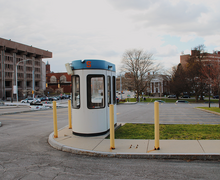Grief Group allows students to talk through sorrow and anxiety
In the middle of a prayer, the Rev. Christine Day turned her thoughts to the grieving students of Syracuse University.
After finding out about the Sept. 11 terrorist attacks, the Episcopal chaplain at Hendricks Chapel joined other campus clergy for prayer, keeping in mind the emotions that would invade the campus.
Now, Day along with the SU Counseling Center’s Susan Levy, heads the Grief Group, a body of eight students that began in order to discuss coping with Sept. 11. Now, in the midst of the event’s one year anniversary, Day anticipates an increase in participation.
‘Everybody grieves in very different ways,’ Day said. ‘The timeline is different. The only sure thing is that nobody’s ready for group work immediately. That’s the only sure thing.’
A recent survey released by the national Centers for Disease Control and Prevention emphasized the need for therapy groups, like Grief Group, after the Sept. 11 attacks. In a telephone survey of 3,512 people in New Jersey, Connecticut and New York, taken a month after Sept. 11, 48 percent of those polled admitted they had feelings of anger left from the incident.
Twenty-four percent polled said they suffered from nervousness and 14 percent said they suffered from sleep problems. Slight increases in alcohol intake and cigarette smoking were also seen among those surveyed.
The recovery from grief occurs in a cyclical fashion, Day said. First, victims are left numb or in denial. Those still suffering from numbness should not seek treatment, but instead should wait for those feelings to subside.
‘People who have losses say they are numb,’ Day said. ‘It’s true. Almost all your functions are dead.’
Eventually, numbness turns to anger, and eventually anger to acceptance. The group is formed, not to speed the process along, but to give victims the sense that they are not going through it alone, Day said.
Before a student can enter Grief Group they are interviewed by Levy. She decides whether they are far enough along in their recovery for their presence in the group to be beneficial to themselves and the other members. Patients who are able to verbalize their pain are chosen over those who remain introverted.
‘There are a number of people who express their preference for groups,’ Dr. Kate Carey, Professor of Clinical Psychology at SU said. ‘They often find social validation and support. There are others who say, ‘Yeah, I felt like that’ and ‘You’re coping very well.’ When things go badly they say, ‘You could try this.’ “
The Rev. Thomas Wolfe, dean of Hendricks Chapel, said counseling services were offered immediately after the attack, but grieving students needed time to recover before facing their pain.
‘The initial response wasn’t what we anticipated,’ Wolfe said. ‘It’s one of those things you create. It’s a field of dreams. If you build it, they will come, but maybe not right away.’
Although there is only one group of eight currently meeting, and most of these have nothing to do with the terrorist attacks, Day said she expects that many closely affected by Sept. 11 will struggle with grief due to the attention focused on the anniversary date by the media.
‘I’m sure a lot of the talk on every radio station will bring those feelings back,’ Day said. ‘(The group) will pick up people. Old grieves will come back and get you.’
Day gave a traditional example of a piece of mail, addressed to a deceased loved one, that would jar a still-wounded family member back into grief.
Wolfe added that there still might be students who have yet to find their way out from the grieving cycle.
‘Some people are really ready to move on,’ Wolfe said. ‘Others are going to re-experience some of those original feelings. Everyone’s in their own zone right now.’
Students feeling angry or depressed don’t even have to have watched a relative or friend fall victim to the terrorist attacks. The stress of an impending war or knowing a person who lost a loved one can also bring on feelings of grief, Carey said.
The Grief Group’s planning began long before Sept. 11. Wolfe said Hendricks Chapel sponsored similar groups until 1999 when the chaplain running the program retried. No chaplain was qualified to run the program until Day arrived in 2000. Soon after, Wolfe began hinting about his desire to re-institute the group. The events of Sep. 11 served as a catalyst, forcing Wolfe and Day to act.
The addition of Levy from the counseling center was a bonus. While chaplains can help grievers deal with spiritual questions and anger with God, Wolfe said they are not prepared to offer long-term therapy. The addition of a member of the counseling center makes such therapy possible.
‘That’s where they start getting into feelings people don’t understand and naming them and working them out,’ Wolfe said.
Due to the fact that both leaders of Grief Group are employees of the University, the program comes at no extra-charge to students. It also means funding will not run out on the program, even after grieving for Sept. 11 subsides and normal patterns of grief return.
Besides Sept. 11, Day said, the Grief Group will also deal with the remnants of the murder of Simeon Popov, deaths to family members, relationship break-ups, job loss and the graduation of close friends.
‘Sometimes we get nailed by waves and it hurts,’ Wolfe said. ‘You can go up and down, right and left. It’s just nice to know that there is someone going along with you.’
Published on September 10, 2002 at 12:00 pm





